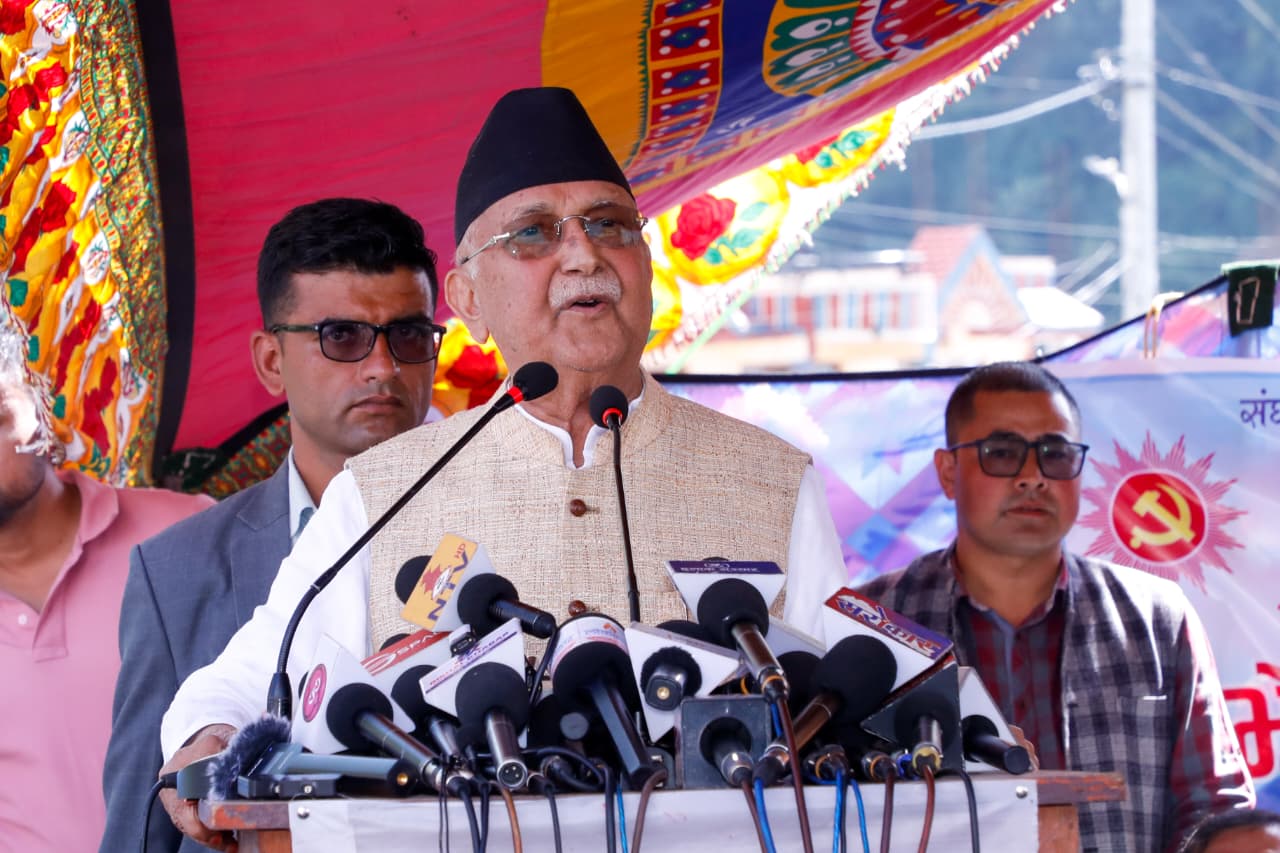

KATHMANDU: Bhaktapur’s quiet Gundu village turned into a political stage of defiance today (Thursday) as former Prime Minister KP Sharma Oli made his sharpest comeback since being ousted by the Gen Z uprising.
The event, staged under the banner of a local “interaction program” by the CPN (UML)’s Bhaktapur District Committee, was less about outreach and more about reclaiming lost ground.
Oli, flanked by loyalists Shankar Pokharel, Bhanu Bhakta Dhakal, Pradeep Gyawali, Guru Prasad Baral and Mahesh Basnet, projected himself as the wronged patriarch of Nepal’s traditional politics, cornered but unbowed.
His tone — fierce, accusatory, and uncompromising — underscored both his intent to fight back and the peril of political confrontation brewing beneath Nepal’s shifting generational divide.
At the heart of Oli’s rhetoric was a refusal — to accept the legitimacy of the new government, to countenance internal restructuring, or to concede any moral ground.
The irony was unmistakable: the same leader who twice dissolved Parliament in 2020 and 2021 now stood as its self-appointed defender, accusing others of constitutional sabotage.
His sudden zeal for parliamentary sanctity was less about principle and more about positioning — a political gambit that could obstruct the fresh general election slated for March 5, 2026.
The symbolism of Gundu
The choice of venue was symbolic. Gundu lies within Mahesh Basnet’s stronghold — a pocket of UML loyalists insulated from the urban discontent that fueled the Gen Z movement.
Basnet, known for his fiery rhetoric, opened the event with threats against critics, warning that anyone entering Gundu with “wrong motives” would be “turned into pickle and sent back.”
It was political theater in its rawest form — blending populist bravado with menace. By sharing that stage, Oli deliberately aligned himself with the militant fringe of his party, signaling that he would not moderate his tone even in defeat.
Recasting the narrative
Throughout his speech, Oli sought to rewrite the story of his downfall. He cast the Gen Z movement not as a legitimate democratic awakening but as a manipulated uprising — a rebellion fueled by “anti-national elements” and “foreign-influenced youth identity.”
Echoing party’s General Secretary Shankar Pokharel’s remarks, he depicted the new government under Prime Minister Sushila Karki as unconstitutional, illegitimate, and unrepresentative of the “real Nepali people.”
It was a classic Oli maneuver: blend nostalgia with nationalism, grievance with defiance. By portraying himself as a victim of procedural injustice, he sought to reframe the youth movement as reckless and destabilizing — a threat to sovereignty rather than an expression of reformist energy.
A party in denial
Yet, what was equally striking was what Oli didn’t say. He offered no self-criticism, no reflection on why thousands of young Nepalis took to the streets demanding generational change, transparency, and accountability.
He avoided mention of the 70-plus young protesters who lost their lives in the Gen Z demonstrations — wounds still raw across the country. Instead, he blamed everything on external plots and internal betrayal, insisting that leadership “reorganization” was irrelevant when the “nation itself is under attack.”
His tone, despite having been forced from power, remained non-repentant — defiant as ever, untouched by public grief.
The shadow of confrontation
What makes Oli’s comeback combustible is his paradoxical posture. Having once dismantled Parliament to secure his grip on power, he now invokes its sanctity as a rallying cry.
His threats — that “the people will rise in a storm of protest” and that Parliament “must be restored by force of the streets” — recall the brinkmanship that threw Nepal into constitutional crisis five years ago.
But this time the context is far more volatile: the government led by Sushila Karki draws legitimacy from youth-led mobilization.
Oli’s rhetoric risks turning Nepal into another political battleground, where the ghosts of recent protests meet the anger of an embattled establishment.
The internal fracture
Within the UML, Thursday’s event also exposed shifting power equations. The silent presence of loyalists like Gyawali and Baral contrasted with the absence of senior vice-chairs such as Ishwar Pokharel.
Oli’s monopolization of the stage mirrored his earlier tendency as prime minister to dominate decision-making. The more he tightens control, the more the party risks rupture.
What lies ahead
Oli’s strategy is clear but perilous. By turning Gundu into a fortress of resistance, he hopes to project strength amid isolation.
His short-term goal is to rally loyalists and paralyze the government through agitation. But the long-term consequence may be deeper fragmentation — within both his party and the polity.
The Gen Z generation that brought him down is slowly organizing, expanding, and shaping discourse. Oli’s old playbook — populism, nationalism, and confrontation — may still resonate with older cadres, but it alienates the youth shaping Nepal’s political future.
The verdict
The Gundu gathering revealed the political psychology of KP Oli post-defeat: defiant yet insecure, rhetorical yet hollow, populist yet cornered.
His vow to defend the same Parliament he once dissolved exposes a staggering irony. His aggressive posture may energize his loyalists, but it risks inflaming divisions, reopening national wounds, and derailing the path to the March 2026 election.
For now, Gundu stands as both warning and mirror — a warning of looming volatility, and a mirror reflecting the stubborn persistence of old power in a country still bleeding for renewal.